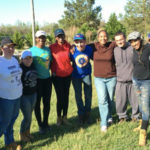Master Lecturer and Writer’s Foundry Review judge Laura Kolbe recently had her poem “Simple” published in the Feb. 6 print edition of The New Yorker.
Kolbe, a writer as well as a doctor and medical ethicist at New York-Presbyterian, gave a lecture to Brooklyn Campus MFA students on Kim Hyesoon’s poetry collection “Autobiography of Death” last year and is the judge for the Writer’s Foundry’s second annual poetry contest.
Her poetry collection “Little Pharma,” published in 2021 by the University of Pittsburgh Press, won critical acclaim and the Agnes Lynch Starrett Poetry Prize.
‘I felt brave enough…’
No stranger to having work published in prominent literary magazines, Kolbe’s most recent piece is focused on love and the sense of yearning.
“In ‘Simple,’ part of what the poem is playing with psychologically is the desperation and longing we can feel in seeking out the love and attention of some elusive Beloved,” she said. “The way we’ll try every trick up our sleeve, going to great verbal and histrionic lengths, to be seen — and, ideally, adored or admired — by the other.”
When Kolbe nears the completion of a manuscript, she identifies pieces to submit for publication. The submission process for a magazine as prestigious as The New Yorker can intimidate, but Kolbe was confident in her recent work.
“It was exciting to get to a point in my book project where I felt brave enough to send some poems to a few of the magazines I most admire, The New Yorker among them.”
A unique perspective
Kolbe’s daily life working as a doctor and writer has, in her eyes, given her a unique perspective that’s benefited both her vocations.
“For me, they are complementary pursuits — the daily work of being a doctor supplies me with an enormous reservoir of images, beautiful troves of language, and a glimpse of human life at every age and every point along the spectrum between joy and sorrow,” Kolbe said.
“It’s more than any one person could ever hope to capture in a lifetime of writing or artistic work of any kind. And the daily work of being a poet presents me with new possibilities in ways of talking to, and listening to, patients,” she added.
Of her recent roles at St. Joseph’s University, Kolbe remarked: “It was a huge honor to be a master lecturer at St. Joseph’s. I’ve also had the honor of judging the Foundry’s annual poetry contest…and so I’ve glimpsed behind the scenes how hard the students work to solicit and consider new poetry and fiction from writers of all stripes.”


